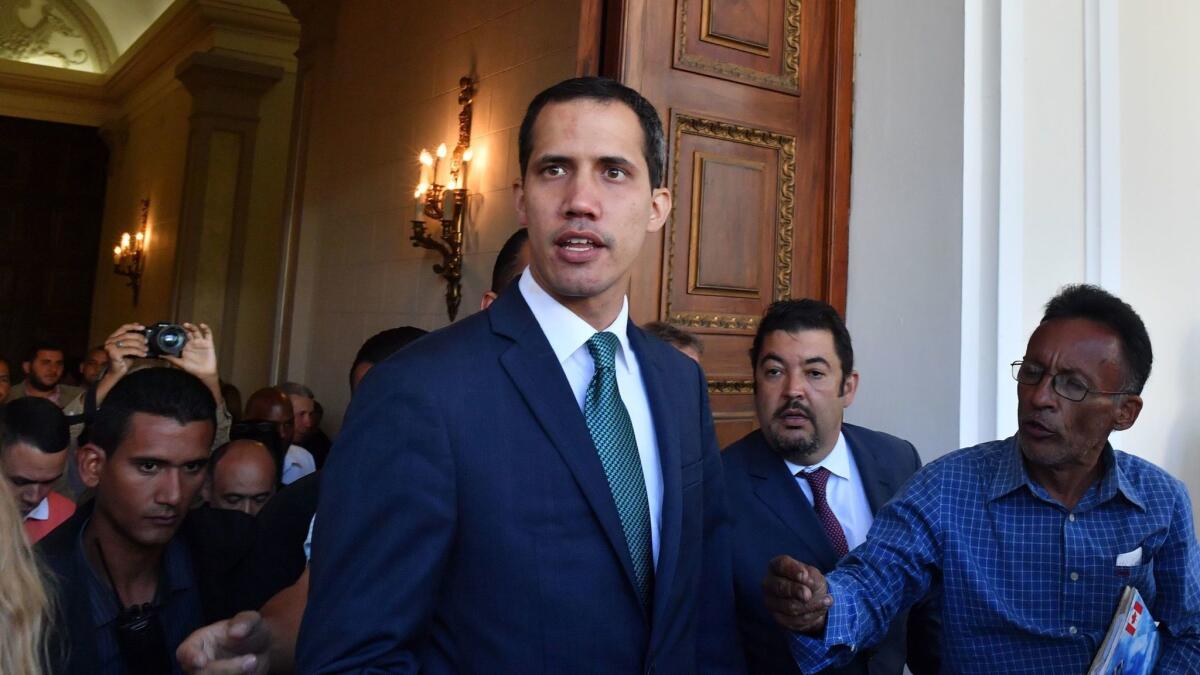European nations recognize Juan Guaido as Venezuela’s leader, putting new pressure on Maduro

- Share via
Reporting from Lisbon — A key group of European Union countries endorsed Venezuelan opposition leader Juan Guaido as the country’s interim president on Monday, piling the pressure on embattled President Nicolas Maduro to resign and let the country hold a new presidential election.
Maduro, for his part, stood defiant, accusing the United States of preparing a coup in the South American country and rejecting a U.S.-backed effort to send emergency food and medicine into his country.
“We are not beggars,” Maduro said on Venezuelan state TV.
Spain, Germany, France and Britain delivered diplomatic blows to Maduro’s rule by publicly supporting Guaido after giving Maduro a Sunday deadline to call a presidential election, which he didn’t heed. Sweden, Denmark, Austria, the Netherlands, Lithuania, Finland, the Czech Republic and Portugal also lined up behind Guaido, the self-declared interim president who also has the support of the United States and many South American nations.
The European countries urged Guaido to hold free and fair elections as soon as possible.
“We are working for the return of full democracy in Venezuela: human rights, elections and no more political prisoners,” Spanish Prime Minister Pedro Sanchez said in a televised announcement.
He said Spain, which has a large Venezuelan community, is also working on a humanitarian aid program for Venezuela, where shortages of basic items are acute. Critics of Maduro blame the Venezuelan government’s mismanagement for the lack of food and medical supplies.
British Prime Minister Theresa May’s spokesman, James Slack, said Britain is considering imposing sanctions to help bring about change in Venezuela.
German Chancellor Angela Merkel said during a visit to Japan on Monday that Guaido “is the legitimate interim president.”
French Foreign Minister Jean-Yves Le Drian, speaking to France Inter Radio, appealed for an early presidential election that will ensure “the Venezuelan crisis ends peacefully.”
Swedish Foreign Minister Margot Wallstrom said the election that brought Maduro to power was neither free nor fair and told Swedish broadcaster SVT on Monday that Venezuelans “now must get new, free and fair elections instead.”
Guaido’s backers say he is the legitimate leader because he is president of Venezuela’s congress, which they regard as the only lawfully elected power in the country.
Around 1 million people in Venezuela also possess a European passport, Portuguese Foreign Minister Augusto Santos Silva told a news conference in Lisbon.
Western Hemisphere nations were set to add to the pressure Monday during a meeting in Canada of the Lima Group, which includes 13 countries that have been vocal in denouncing Maduro.
But the socialist leader showed no signs of caving in and lashed out at the EU and the Trump administration, which has also put pressure on the Venezuelan government by imposing sanctions on Venezuelan oil exports and demanding Maduro’s departure.
“I don’t accept ultimatums from anybody,” Maduro told Spanish TV channel La Sexta in an interview broadcast late Sunday. “Why should the EU be giving ultimatums to a country?”
Guaido on Twitter expressed his gratitude to the EU leaders for supporting Venezuela’s fight for freedom.
More to Read
Sign up for Essential California
The most important California stories and recommendations in your inbox every morning.
You may occasionally receive promotional content from the Los Angeles Times.













